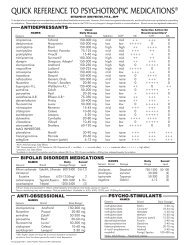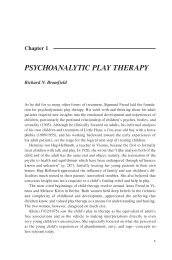IRAQ WAR CLINICIAN GUIDE
Iraq War Clinician's Guide - Network Of Care
Iraq War Clinician's Guide - Network Of Care
Create successful ePaper yourself
Turn your PDF publications into a flip-book with our unique Google optimized e-Paper software.
Iraq War Clinician Guide 182 A~aendixI<br />
article, Campsot~tlinesthe ethical dilemmas for military psychiatrists who believe<br />
that their responsibilities to the military are sometimes in conflict with their<br />
responsibilities to the individual patient.<br />
Military personnel who do not respond to the front-echelon treatment<br />
should be offered critical incident stress debriefing in a group context if Illis has<br />
not vet occurred. Careful vsvchiatric . , assessnrent (including ruling out phqsieal<br />
cauics for the psychiatric symplums) is beit carried out d hng & ir~itialbmgfree<br />
interval. Once ihe diagnosis is eslablished, pharmacolherapy niay be initialed<br />
as appropriate to the diagnosis. There are theoretical reasons to believe that<br />
early triabneit with appropiiate drugs may prevent some of the long-term<br />
sequelaeof exposure to trauma, including the later development of MSD!'<br />
TREATMENT<br />
Treatment of PTSD nearly always should include psychotherapy (group or<br />
individual or both), plrarmacolherapy. pwr gmup participation, and family therapy.<br />
Although most heatment for PTSII occurs in an outpatient setting, there<br />
also is a place for the use of both short-term hospitalization durimg periods of<br />
crisis and longer term inpatient pmgrams for intensive treatment and rehabilitation.<br />
In addition, treatment of alcohol or other substance abuse or dependence is<br />
often a prominent nwd for many veterans vvjth MSD.<br />
Modes of psychotherapy that have bccn used to neat war zone-related<br />
FED can be broadly divided into psychodynamic treahnents and cognitive<br />
behavioral treatmenh." Common lo both types of treatment is the encouragement<br />
of exposure to Hle traumatic nremories and the associated physiologic and<br />
affective responses (often called abreaction in dynamic models and prolonged<br />
exposure in cognitive-behavioral models), coupled with attempts lo integrate the<br />
traumatic experience into one's life story or cognitive schemas. SmrfieldU in<br />
wvierving several models of recovery defined five common essential treatment<br />
principles in all the psychotherapies reviewed, including: (1) establishing a tlrcrapeutic<br />
alliance; (2) providing education about stress responses and the recovery<br />
from trauma; (3) providing help with anxiety management and reduction;<br />
(4) facilitating the reexperiencing of the trauma in a tolerable, safe manner; and<br />
(5)helping will1 integration of Llle traumatic events.<br />
In fact, few treatments for ITSD in military veterans (or other trauma survivors)<br />
have been rigorously evaluated. We arc arvare of only eight randomized.<br />
controlled trials of treatment for military vetcrans.llwse include four drug trials<br />
-and four trials of cognitive or behaviornl treatments?" The cognitive behavioral<br />
treatments tested indude prolonged exposure, relaxation techniques, and drsensitization<br />
techniques. The psychotropic medications that have been assessed in<br />
this population are phenelzine, imipramine, desipranrine, and amilriptyline. In<br />
general, successful treatment reduces the intmsion/re-erpciienci~lgand hyperarousal<br />
symplorns of MSD and is less soccmful with avoidantlnumbingsynptonrs.<br />
Psychotherapy and pharmacotlrer;ipy of BED arc reviewed elscrvherc in<br />
thi+ ....- ~CF,,P~ --.<br />
An additional option for American Vietnam veterans is treatment at a velerans'<br />
center. 'niese are commu~~ily-based centers that enlphasi;.~peer counsrling,<br />
group therapy, community in;~olvement,and family ireatment and educat10nP<br />
Questions of moral including guilt over acts of omission and<br />
comn~ission,and existenli;tl questions, resixlting lrom the cxpct.ience of parlici.<br />
paling in combat and other tmumatic war-zone events, are perhaps best addressed<br />
in the context ol peer groups and best ameliorated through acti\'e ene,agemcnt<br />
in the community.<br />
DEPARTMENT OF VETERANS AFFAIRS<br />
-<br />
NATIONAL CENTER FOR PTSD




